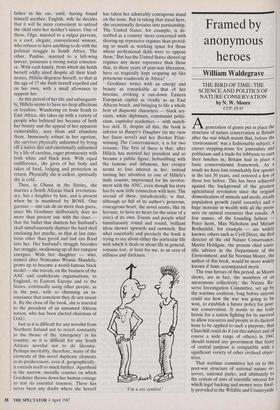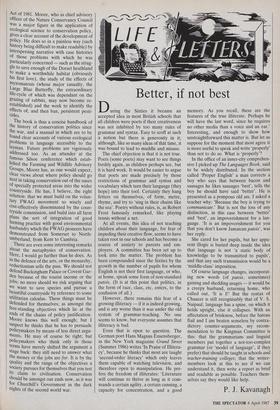Framed by anonymous heroes
William Waldegrave
THE BIRD OF TIME: THE SCIENCE AND POLITICS OF NATURE CONSERVATION by N. W. Moore CUP, f9.95 Ageneration of giants put in place the structure of nature conservation in Britain after the war which meant that, before the `environment' was a fashionable subject, a career stepping-stone for journalists and politicians and a trade for lobbyists to earn their lunches in, Britain had in place a basic conservationist framework. As a result we have lost remarkably few species in the last 50 years, and restored a few of those lost before. This has been achieved against the background of the greatest agricultural revolution since the original domestication of animals and seeds; steady population growth (until recently) and a huge increase in wealth with all the press- ures on natural resources that entails. A few names, of the founding fathers Peter Scott, Max Nicholson and Miriam Rothschild, for example — are widely known; others such as Cyril Diver, the first director of the old Nature Conservancy, Martin Holdgate, the present chief scien- tific advisor in the Department of the Environment, and Sir Norman Moore, the author of this book, would be more widely known if fame accompanied merit.
The true heroes of this period, as Moore shows, are in fact, the members of an anonymous collectivity: the Nature Re- serve Investigation Committee, set up by the wartime coalition, long before anyone could see how the war was going to be won, to establish a future policy for post- war conservation. It seems to me truly heroic for a nation fighting for its survival to allow resources and people in its darkest hour to be applied to such a purpose; that Churchill could do it (on this subject and of course a wide range of others) in 1941 should remind any government that fixity of central purpose is compatible with a significant variety of other civilised objec- tives.
That wartime committee led on to the post-war structure of national nature re- serves, national parks, and ultimately to the system of sites of scientific interest for which legal backing and money were final- ly provided in the Wildlife and Countryside Act of 1981. Moore, who as chief advisory officer of the Nature Conservancy Council was a major figure in the application of ecological science to conservation policy, gives a clear account of the development of policy. He does so in a painless way (such history being difficult to make readable) by interspersing narrative with case histories of those problems with which he was particularly concerned — such as the strug- gle to save enough of the Dorset heathland to make a worthwhile habitat (obviously his first love), the study of the effects of myxomatosis (whose major casualty, the Large Blue Butterfly, the extraordinary life-cycle of which was dependant on the grazing of rabbits, may now become re- established) and the work to identify the effects of, and then ban, persistent pesti- cides.
The book is thus a concise handbook of the history of conservation politics since the war, and a manual in which are to be found clear accounts of various ecological problems in language accessible to the layman. Future problems are vigorously addressed too. As an attender at the famous Silsoe conference which estab- lished the Farming and Wildlife Advisory Groups, Moore has, as one would expect, clear views about where policy should go next in taking conservation out of the oases of specially protected areas into the wider countryside. He has, I believe, the right solution: that we must build on the volun- tary FWAG movement so wisely and cost-effectively disseminated by the coun- tryside commission, and build into all farm Plans the sort of integration of good farming practice with good environmental husbandry which the FWAG pioneers have demonstrated from Somerset to North- umberland, from Kent to Cumbria.
There are even some interesting remarks about the metaphysics of conservation. Here, I would go further than he does. As in the defence of the arts, or the monarchy, reductionism sells the pass. We should not defend Buckingham Palace or Covent Gar- den because of the tourist income or the Jobs; no more should we risk arguing that we want to save species and pursue a beautiful countryside by reference to some utilitarian calculus. These things must be defended for themselves; as amongst the free-standing objectives which lie at the ends of the chains of policy justification. Moore knows this well enough; but I suspect he thinks that he has to persuade policymakers by means of less direct argu- ments. He may of course be right; but policymakers who think only in those terms have merely shifted the argument a stage back: they still need to answer what the money or the jobs are for. It is by the quality and the range of the objectives a Society pursues for themselves that you test its claim to civilisation. Conservation should be amongst our ends now, as it was for Churchill's Government in the dark nights of the second world war.



























































 Previous page
Previous page